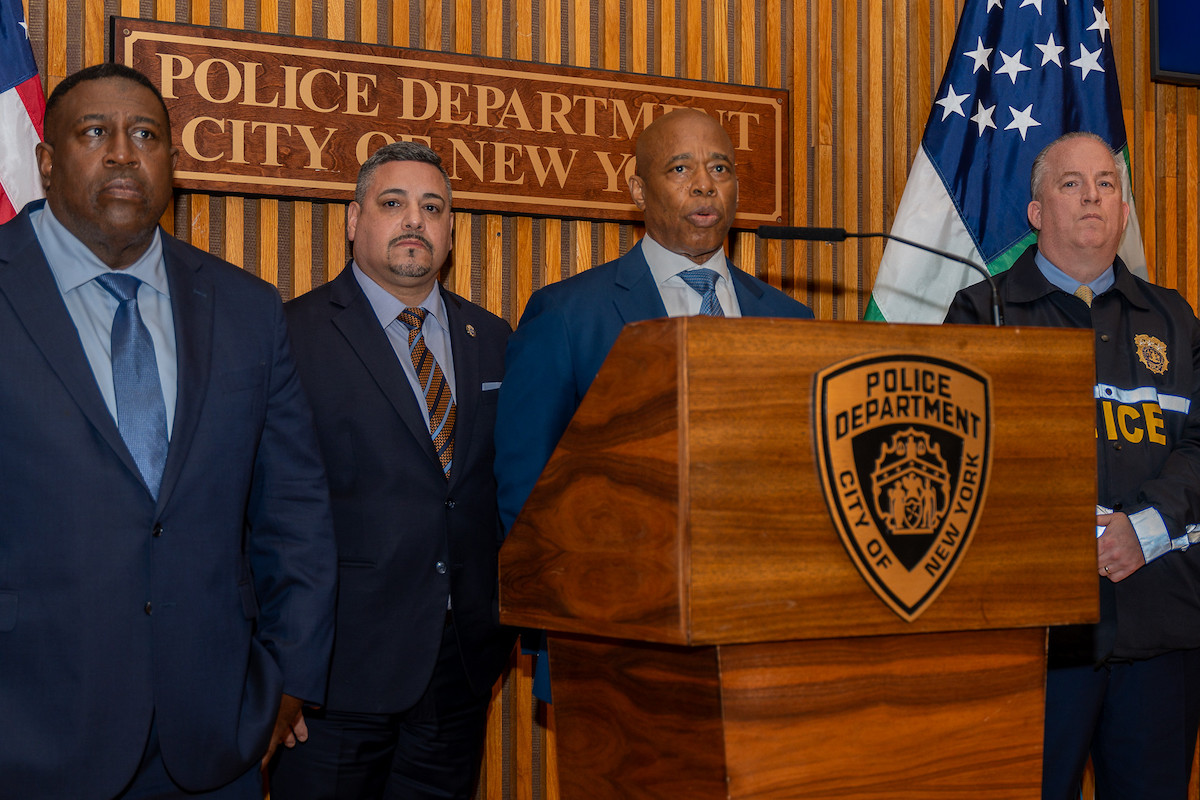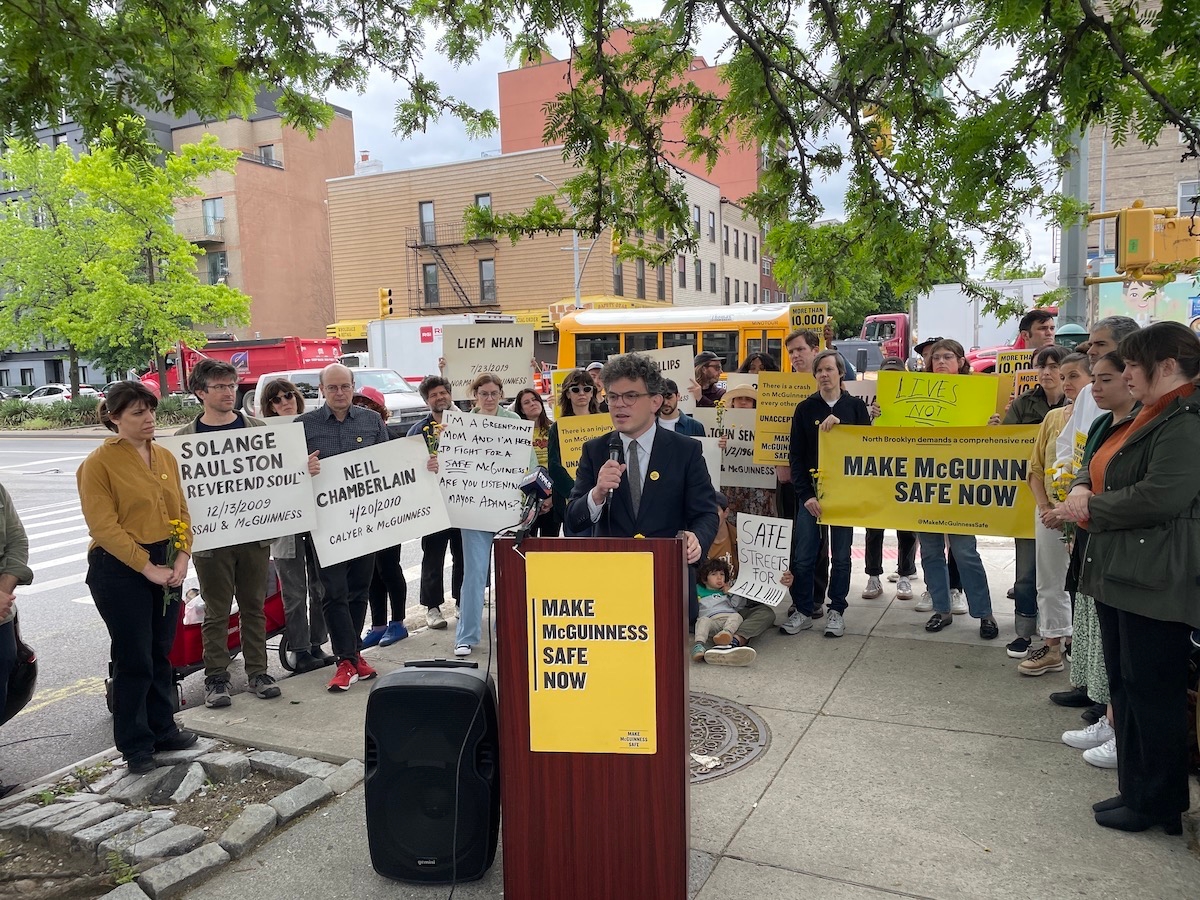Over the last week, top NYPD officials have flooded the local and national TV airwaves to back up Mayor Eric Adams's claims that "outside agitators" infiltrated college campuses in their quest to "radicalize young people." The officers wielded props like bike chains and academic textbooks on terrorism, and made outlandish claims in their official capacities as senior ranking members of the country's largest police department. NYPD Chief of Department John Chell ended the week with an attack on a City Councilmember who dared to challenge the police department's narrative on student protests. Chell also appeared on Newsmax and proclaimed that a shadowy entity, "probably bigger than New York City" is behind the student protests that have sprung up at campuses across the city.
These officers are doing all of this with the explicit blessing of Mayor Adams. Why does the mayor, a former NYPD captain himself, tolerate these kinds of freewheeling, incendiary comments from his police executives?
The answer may have to do with Adams's own career at the NYPD, during which he was disciplined for making his own bombastic comments on TV. In his 22 years at the department, Adams was found guilty of a single disciplinary charge, for speaking in his capacity as an NYPD officer without getting the department's permission. He retired in 2006, shortly after the verdict was issued.
Adams's NYPD disciplinary records related to the charge, obtained by Hell Gate and published here for the first time, feel quaint compared to the present day status quo. Captain Adams mildly criticized the mayor and the police commissioner when he was off-duty. But here in these documents, Adams is proclaiming on television that he was "in charge," that he knew better than City Hall, and that he shouldn't be punished for saying so, even if it all wasn't, strictly speaking, true.

The trouble for Captain Adams began after he gave an interview to WCBS reporter Marcia Kramer that aired on Sunday, October 16, 2005. The six-minute clip appears to be lost to time, but according to the charging documents, Adams, then assigned to Manhattan's Sixth Precinct, was "critical of both Mayor Bloomberg and Police Commissioner Kelly" for their response to an alleged terrorist threat in the subway system. Ten days earlier, Kelly and Bloomberg had given a press conference about this "specific" threat, and told the public that they were sending more police officers into the subway system to address it.
To Captain Adams and the organization he helped lead, 100 Blacks in Law Enforcement Who Care, the way the threat had been communicated and responded to sounded "politically motivated," as he put it in the interview, quoted in the charging documents. For one, the terrorism announcement came the same day as a mayoral primary debate at the Apollo Theater that Bloomberg, who was running for reelection, refused to attend. (Adams was backing the mayor's challenger, Fernando Ferrer.)
Also, Adams contended, in his opinion, the mayor and the police commissioner waited too long to deploy the officers, and didn't deploy them across the city as they should have. Whatever Kelly and Bloomberg were telling the public about when and how the police were deployed, it wasn't true, Adams said.
"When we first found out about this incident on Monday, we should have immediately deployed police to the transit location," Adams told Kramer. "I'm a captain in the New York City Police Department. I have a master's in this topic. I was put in charge of the assignment of safeguarding the transit system during those hours, the entire lower Manhattan." (Asked to comment, Mayor Bloomberg told WCBS, "Given the source, it shouldn't be given very much credibility.")
Three days after the interview aired, officers from Internal Affairs opened an investigation, and eventually charged Adams with three offenses: disseminating misinformation to the public, divulging official NYPD business, and speaking as a representative of the NYPD without permission.
At the two-day departmental trial held in February of 2006, Adams noted that he had given hundreds of these kinds of interviews in his capacity as a member of 100 Blacks in Law Enforcement Who Care without incident, interviews in which he criticized the lack of diversity at City Hall and NYPD headquarters, and the efficacy of bag checks in the subway system.
But now, Adams said he was being retaliated against because he had filed internal complaints against NYPD spokesperson Paul Browne, after Browne referred to Adams and Anthony Miranda, a former NYPD officer who was then the head of the National Latino Officers Association (and is now New York City's sheriff), as "dumb and dumber."
"In support of his contention, [Adams] pointed out that he is being charged for the first time for conduct that he has openly engaged in for 15 years," the summary of the departmental trial states.
"Police have a First Amendment right to speak out too. But in the context of that, you have to exercise good judgment. And sometimes even though you have the right to speak out, maybe you shouldn't," civil rights attorney Norman Siegel, who represented Captain Adams at the NYPD proceeding, told Hell Gate. But there's a higher standard when police are speaking in uniform and being identified as part of the department. When this happens, Siegel said, "the rules are different, because then you're really being presented to the public as someone who's an agent of the police department."
At the hearing, Siegel noted on the record that they could not figure out who exactly complained about Adams's interview and initiated the charges in the first place. "We assumed it was the higher ups at the NYPD, that they were out to get him. So they thought, in my opinion, they thought they had him," Siegel recalled. (Full disclosure: Siegel represented this Hell Gate reporter in getting his press credentials in 2012.)
During his trial, Adams stressed that he was not speaking in his official capacity—he was off-duty and wearing civilian clothes when he gave the interview to Kramer (who is still a regular at mayoral press conferences and often gets one of the first questions), and though the chyron on the screen identified him as "Captain Adams," that wasn't his fault, and he wasn't given a chance to correct it.

As for why he referred to himself as a captain three times during the interview, Adams replied, "Often when I do interviews, I describe what I do for a living." While he had noted in the WCBS interview that the NYPD didn't deploy officers based on the threat, he explained that he meant to say they hadn't been deployed "city-wide," which was based on some anecdotal observations made by members of 100 Blacks in Law Enforcement Who Care. "I failed to accurately pronounce it the way I wanted to," Adams admitted.
In his written decision, the NYPD's assistant deputy commissioner of trials, Michael Sarner, was mostly sympathetic to Adams. Sarner wrote that Adams hadn't disrupted the NYPD's response to the terrorist threat because according to the documents submitted as evidence, that threat had evaporated by the time Adams gave his interview. And while the NYPD had in fact mobilized hundreds of officers based on the threat, the documents showed that the threat was not very "specific" at all, and that most of the additional cops were concentrated in Lower Manhattan. Yes, Adams had a superior officer at the time, so he technically wasn't "in charge," but she also testified that she wasn't briefed on the threat either. "The information conveyed by [Adams] during his televised interview is also constitutionally protected even if it is mistaken and cannot form the basis for discipline," Sarner wrote, and found Adams not guilty of disseminating misinformation to the public and divulging official NYPD business.
But Sarner found Adams guilty of speaking in his official capacity without permission, because he "thrice emphatically and primarily referred to himself by his rank and responsibilities, while trumpeting his official duties and assignments during the period of the terror alert," Sarner wrote. He added, "By assuming this posture, [Adams] imbued his claims and comments with the credibility derived from his official position and, in so doing could have confused, misled, and panicked viewers into believing that he was speaking on behalf of a department he had criticized and contradicted."
Sarner recommended docking Adams 15 vacation days. Siegel said he wanted to appeal, but that Adams told him he shouldn't bother; Adams retired shortly after to begin his political career.
Back in the present day, this week, the City's Department of Investigation opened an investigation into the public comments made by NYPD officials like Chief Chell. At his weekly off-topic press conference on Tuesday, Mayor Adams made it clear that he believes his officers display the correct amount of "decorum."
"I think we are the kindest and the gentlest and the most loving police department on the globe," Adams said. The Mayor's Office and the NYPD did not return our requests for comment on this story.
Siegel, who has worked with the Adams administration since the mayor took office, said he was taken aback by the mayor's defense of his police brass's behavior. "I was surprised that Eric wasn't at least somewhat critical of the guy, but I assume now that he's the mayor, and they all think the police department is theirs now, that he wants to defend his people," Siegel said, referring to Chell. "So he's in a different position now, that, in my opinion, is not the most principled way to deal with this stuff."
Siegel added, "There's comments that he made, especially about the City Councilperson Caban—I thought that was inappropriate, bad judgment."
Siegel mused that the mayor's experience back in the early aughts could provide a teachable moment for his police brass.
"Now Mayor Adams should explain to Chell the differences, the do's and don'ts," Siegel said. "I think that would be very appropriate."
You can read the documents below.
NYPD Internal Affairs Bureau Records:
NYPD hearing summary:
Sammy Sussman obtained these records as part of a long-term investigation with Annika Grosser and Sanjana Bhambhani in partnership with MuckRock and New York Focus into tens of thousands of pages of previously-unreleased police disciplinary files relating to law enforcement agencies throughout New York State. This project is supported by the Fund for Investigative Journalism and the Data-Driven Reporting Project.





